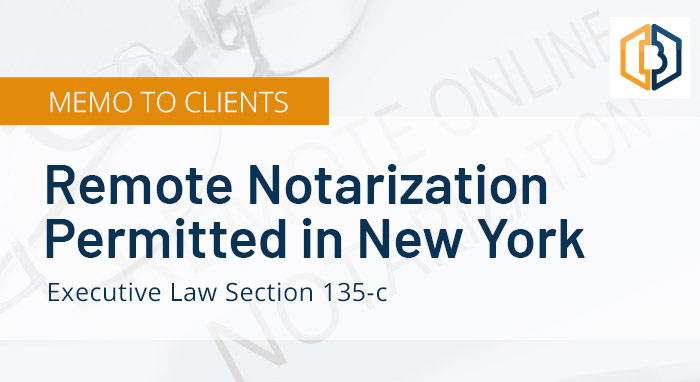Remote Notarization Permitted in New York

On February 24, 2022, Gov. Kathleen C. Hochul signed into law legislation that allows for the permanent use of remote online notarizations (“RON”) in New York. For the full text of Chapter 104 of the Laws of 2022, amending the Executive Law on February 24, 2022, see https://www.nysenate.gov/legislation/bills/2021/s7780.
The bill also permits Remote Ink Notarizations (“RIN”), which is similar to remote notarization that was once permitted under the now expired Executive Order.
The legislation defines remote online notarization as the act of performing any notarial act while a principal is not in the physical presence of the notary at the time of the notarial act.
- Remote notarization can be by either electronic signature or wet signature (defined as a signature affixed in INK to a PAPER document).
- The notary public must physically be in New York State at the time of the notarization.
- The principal (the person whose signature is being acknowledged) can be out of the state or country.
- The notary and the principal must be able to communicate with each other in real-time, i.e., must be able to see and interact with each other via the audiovisual communication technology (which technology must have security protocols in place to prevent unauthorized access).
- The notary must identify (authenticate) the remote signor of the document through one of the following three (3) methods:
- notary’s personal knowledge of the signor; or
- oath or affirmation of a credible witness who personally knows the signor and who is either personally known to the notary or identified per identity proofing or credential analysis; or
- by means of communication technology that facilitates remote presentation by the signor of an official, acceptable form of ID, credential analysis, and identity proofing. Commercial software provided by a third-party vendor must be used for credential analysis or identity proofing. Credential analysis validates the authenticity of the principal’s government-issued identification, and identity proofing validates the identity of the individual principal. (Benchmark is currently vetting such third-party providers).
- In addition to the foregoing, the following also applies if Remote Ink Notarization (“RIN”) is utilized:
- the principal appears before the notary by means of audiovisual communication technology to perform the notarial act; and
- the signed document must be transmitted by the principal to the notary via mail, fax, or electronic means to affix his/her signature and stamp; and
- the notary must transmit the notarized document back to the principal via mail, fax, or electronic means.
- The statute states “An electronically transmitted document notarized pursuant to this paragraph shall be considered an original document.”
- The notary must confirm that the document being notarized is the same as the one signed remotely before applying the notary stamp and signature to the document.
- The following statement must be added to the jurat: “This remote notarial act involved the use of communication technology.”
- The notary must maintain a journal of each remote notarization and same must be retained for as long as the notary remains in office and then for an additional 5 years thereafter.
- The notary must record (and retain for ten years) the remote notarization (and a back-up).
- County Clerks are required to accept for recording a copy of an electronic record if it has been certified by the notary (the legislation contains sample certification language).
On January 31, 2023, some rules for remote notarization will change. One significant change is that as of January 31, 2023, any notary wishing to provide remote notarization must register the capability to perform electronic notarizations with the NYS Department of State, Division of Licensing Services, and pay the requisite fee (which is to be determined and established in regulation) to act as an electronic notary.
Additionally, on January 31, 2023, the RIN form of notarization will no longer be permitted.
A complete, detailed explanation of the requirements of this new legislation is beyond the scope of this memorandum. We have tried to summarize and highlight the important provisions of the new law affecting real estate practitioners. We will issue further memorandum and anticipate holding a CLE on remote notarizations in the near future. The Department of State has issued a FAQ section related to the new statute and you may review the same here: https://dos.ny.gov/notary-public#remote-notarization-faqs.
As always, please contact us with any questions.



